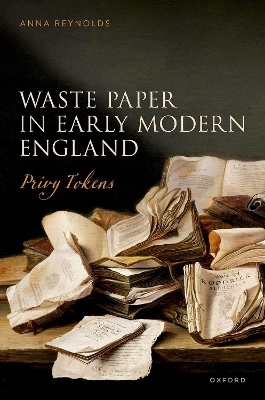
Waste Paper in Early Modern England
Oxford University Press (Verlag)
978-0-19-888270-1 (ISBN)
The ubiquity of waste paper in early modern England has long been misunderstood. Though insults and modesty tropes that refer to waste paper are widespread, these have often been dismissed as nothing more than rhetorical flourishes. Paired with the common misconception that paper would have been too valuable to 'waste' in the sixteenth and seventeenth centuries, these tropes have been read as scatological flights of fancy. Waste Paper in Early Modern England argues that such commonplaces are in fact indicative of everyday, material experience - of an author's, reader's, housewife's, or city-dweller's immersion in an environment brimming with repurposed scraps and sheets. It demonstrates that waste paper makes visible a radically different understanding of waste matter in the early modern period than in our own. More than a rhetorical aside, repurposed pages were both materially and figuratively useful. Drawing on a range of literary, pictorial, and bibliographical sources, Waste Paper in Early Modern England reveals how layers of meaning accreted around paper fragments in the sixteenth and seventeenth centuries, and how, because of the widespread sensitivity to the life cycle of paper and books, wasted pages prompted meaningful imaginative work. The book's five chapters recount how, in this period, the biography of waste paper provided a thing to think with concerning matter and temporality - a potent and flexible emblem for the troublesome passage of books and all other sorts of bodies through time.
Anna Reynolds completed her PhD at the University of York in 2018. She has held lecturing positions at the University of York and the University of St Andrews, and is currently a University Teacher in Early Modern Literature at the University of Sheffield. She has published articles and chapters in The Journal of the Northern Renaissance, The Oxford Handbook of Early Modern Women's Writing in English (2023), The Oxford Handbook of the History of the Book in Early Modern England (2023), Practices of Ephemera in Early Modern England (Routledge, 2023), and co-edited The Paper Trade in Early Modern Europe (Brill, 2021).
Introduction: Waste Matter
1: The Material History of Waste Paper
2: Pepper and Mackerel: The Waste Paper Trope
3: Butterflies and Binders' Shops: Reading Monastic Waste
4: Pickled Paper: Thomas Nashe's Poetics of Waste
5: Out of Date Almanacs and Middleton's 'Mouldy Stuff'
Coda: Living with Waste
| Erscheinungsdatum | 29.02.2024 |
|---|---|
| Verlagsort | Oxford |
| Sprache | englisch |
| Maße | 162 x 240 mm |
| Gewicht | 516 g |
| Themenwelt | Geschichte ► Teilgebiete der Geschichte ► Kulturgeschichte |
| Geisteswissenschaften ► Sprach- / Literaturwissenschaft ► Anglistik / Amerikanistik | |
| Geisteswissenschaften ► Sprach- / Literaturwissenschaft ► Literaturwissenschaft | |
| ISBN-10 | 0-19-888270-X / 019888270X |
| ISBN-13 | 978-0-19-888270-1 / 9780198882701 |
| Zustand | Neuware |
| Informationen gemäß Produktsicherheitsverordnung (GPSR) | |
| Haben Sie eine Frage zum Produkt? |
aus dem Bereich


